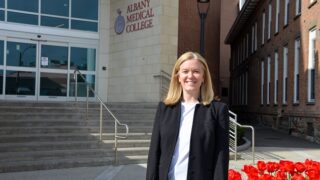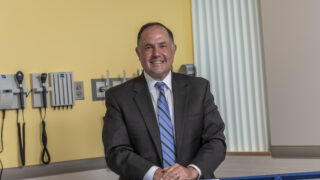Pathology for Medical Providers
Pathology and Laboratory Medicine at Albany Medical Center
The Division of Anatomic Pathology is subspecialized into services in autopsy pathology, bone/soft tissue, breast pathology, cytopathology/gynecologic pathology, dermatopathology, gastrointestinal and hepatobiliary pathology, genitourinary pathology, head and neck/pulmonary pathology, hematopathology, medical renal pathology, neuropathology, and frozen section service.
With 85,000+ annual interpretations and pathologists working in 13 subspecialties, our multidisciplinary teams help provide the best care for your patients.
Additional laboratory services are offered at Columbia Memorial Health, Glens Falls Hospital and Saratoga Hospital.
Learn more about blood draw locations in the Albany Med Health System.
Contact Information
Dept. of Pathology and Laboratory Medicine at Albany Medical Center
43 New Scotland Ave.,
Albany, NY 12208
518-262-4549
Anatomic Pathology (speak to a dermatopathologist)
518-262-5454
Latonya Melvin, Client Relations (reports, supplies, technical issues)
518-262-5461
[email protected]
Sara Laviska, Anatomic Pathology Manager (specimens, courier issues)
518-262-5731
Incoming Microbiology Specimen Notification (ask to speak to a supervisor)
518-262-3511
More information on individual laboratories and other services can be found below.
The Cellular Immunology laboratory offers a comprehensive diagnostic test menu, including leukemia/lymphoma immunophenotyping, lymphocyte subset analysis and paroxysmal nocturnal hemoglobinuria (PNH) detection.
The laboratory can accept peripheral blood, bone marrow, tissue biopsy samples and various body fluids. The samples are first stained with a panel of monoclonal antibodies that are selected based on the clinical indications. Specimens are processed and the immunophenotype of each cell is recorded. Staff then separate normal and abnormal cells based on the presence or absence of specific markers. The final diagnostic interpretation is rendered by a hematopathologist after correlation with morphological and ancillary findings. Reflex testing may occur to fully characterize a disease state or clarify any abnormalities.
The Cellular Immunology laboratory operates Monday through Friday, 8:30 a.m. to 5 p.m. There is on-call coverage for weekend and holiday STAT testing.
Phone: 518-262-5367
Fax: 518-262-5048
In the clinical chemistry laboratory, the vast number of inpatient and outpatient samples are processed for the detection and/or management of electrolyte balance, cardiac functionality, diabetes management, cholesterol monitoring, endocrine stability, hepatic health, pulmonary metabolism, alcohol and ethylene glycol toxicity, drug level monitoring and immunoglobulin antibodies. In addition, the laboratory conducts heavy metal testing, organ transplant monitoring, serum and urine electrophoresis and immunofixation.
Phone: 518-262-3515
Fax: 518-262-3678
The Cytopathology laboratory works closely with providers to evaluate specimens from various body sites such as pleural, pericardial, peritoneal, and cerebrospinal fluids, for the detection of cancer, precancerous changes and benign conditions.
Testing offered:
- In-house, Liquid Based, Thin Prep, monolayer gynecologic testing with or without automated imaging (which ensures that a gynecologic pap test has two reviews; one by the imaging computer and another by an experienced licensed cytotechnologist)
- In-house cervical HPV testing for screening and genotyping within an integrated pap smear report
- In-house Liquid Based, Thin Prep, monolayer and conventional non-gynecologic testing
- Fine Needle Aspiration (FNA) service for inpatient and outpatients in the operating room, interventional radiology, ultrasound, and endoscopic procedures to access cellular adequacy
- Work with our in-house multi-disciplinary team and ancillary labs for specialized testing such as: immunohistochemistry, flow cytometry, and molecular diagnostic testing on cytology specimens
The Cytology laboratory operates Monday through Friday 8 p.m. - 4:30 a.m., with the exception of holidays.
Phone: 518-262-8681
Fax: 518-262-1147
FISH is a molecular cytogenetic technique that uses fluorescent probes to identify a specific DNA sequence on a chromosome. Once bound to the DNA, the probes are detected with a fluorescent microscope. Dedicated software captures images that are reviewed for chromosomal abnormalities.
The FISH laboratory operates Monday through Friday, 8:30 a.m. to 5 p.m.
Phone: 518-262-9429
Fax: 518-262-5048
The Hematology laboratory operates 24 hours a day, 7 days a week.
- CBC with automated six-part differential
- Manual smear reviews via CellaVision
- PT, PTT, D-Dimer, Fibrinogen, HIT, and anti-Xa, via ACL-TOP
- Coagulation factor activity and quantification
- Von Willebrand’s testing
- Coagulation factor inhibitor detection
- PFA-100 testing
- Platelet light aggregometry
- VerifyNow platelet testing
- TEG thromboelastography testing
- Lupus anticoagulant testing
- Cryoglobulin and cryofibrinogen testing
- G6PD Deficiency testing
- Fetal hemoglobin screen
- Bone marrow aspirate processing
- CSF cell count
- Sedimentation rate
- Procalcitonin testing
- Microscopic and chemical urinalysis
- EBV testing
Consultative Services
- Evaluation of hypercoagulability and bleeding diatheses
- Evaluation of morphologic peripheral smear abnormalities
Education
Hematology lectures are provided to residents and technologists.
Phone: 518-262-3531
Fax: 518-262-4420
The Histology Department processes over 150,000 paraffin-embedded tissue blocks and prepares more than 300,000 slides annually. Specimens such as bone marrow core biopsies, dermatology biopsies, large surgical resections and biopsies as well as tissue obtained during autopsies are handled by Histology. The staff are responsible for grossing, processing and producing slides for the pathologic evaluation and diagnosis of the disease state by the attending pathologists.
Advanced diagnostic aids offered include:
- Special stains
- Immunohistochemical staining
- In situ hybridization
- Direct immunofluorescents
- Enzyme histochemistry
- Electron microscopy
The Histology laboratory operates Monday through Friday, 8:30 a.m. to 5 p.m. Autopsy services operate Monday through Friday, 8 a.m. to 4:30 p.m., with on-call coverage 4:30 p.m. to 8 a.m.
Phone: 518-262-3736
Fax: 518-262-8669
The Microbiology laboratory is a high-volume clinical laboratory providing testing and expertise to aid in the diagnosis and treatment of infectious diseases.
Testing offered:
- Blood culture with direct identification and susceptibility testing from positive cultures
- Identification of aerobic and anaerobic bacteria in culture with appropriate susceptibility testing
- Identification of mycobacteria including M. tuberculosis and nontuberculous mycobacterium
- Identification of fungi with susceptibility testing of yeast
- Microscopic identification of blood and intestinal parasites
- Identification of viruses directly from stool, respiratory and CSF samples
The Microbiology laboratory operates 24 hours a day 7 days a week.
Phone: 518-262-3511
Fax: 518-262-8161
The Molecular Diagnostics laboratory provides a broad array of molecular microbiology testing in bacteriology, mycobacteriology, mycology, parasitology, and virology, as well as DNA based genetic testing for coagulopathies. The test menu includes more than 60 different tests, of which more than half are esoteric lab developed tests, particularly in the areas of virology, surveillance testing, and tickborne diseases.
Testing Offered:
- Detection of bacterial and viral respiratory pathogens from the upper and lower respiratory tract
- Rapid detection of M. tuberculosis and M. avium complex
- Rapid identification of organisms associated with bacterial and viral meningitis or encephalitis and sepsis
- Surveillance testing by molecular techniques for a wide variety of highly resistant organism, including Carbapenem resistant Enterobacteriaceae (CRE, blaKPC and blaNDM) and Candida auris
- Women’s health and STI testing for bacterial and viral pathogens, including genital mycoplasmas and HPV with high-risk genotyping
- Viral load monitoring for HIV, HCV, CMV, EBV and Polyomavirus BK. HCV Genotyping to aid in therapeutics
- Routine virus detection by molecular techniques
- Tickborne diseases such as Anaplasma, Ehrlichia and Babesia
- Identification of mutations associated with coagulopathies
- Latent tuberculosis infection (LTBI)
The Molecular Diagnostics laboratory operates 7 days a week, 7 a.m. to 11 p.m. Many services are available 24 hours a day 7 days a week.
Phone: 518-262-3483
Fax: 518-262-8896
The Serology/Immunology laboratory provides a broad array of diagnostic immunology testing including autoimmune, infectious disease and allergy testing. Autoimmune testing monitors autoantibodies generated in a variety of diseases such as systemic lupus erythematosus, Wegener granulomatosis, rheumatoid arthritis, antiphospholipid antibody syndrome and celiac disease. Infectious disease antibody testing includes, among others, hepatitis, HIV, herpes simplex, Lyme, syphilis, and Covid-19.
The Serology laboratory operates Monday through Friday, 7:30 a.m. to 4:30 p.m. There is on-call coverage for weekend and holiday STAT testing.
Phone: 518-262-3508
Fax: 518-262-8120
Point of Care testing brings the clinical laboratory to the patient bedside. This lab testing is able to be performed by nursing staff all throughout the hospital and clinics. Most results are available in five minutes or less, helping physicians provide the best care possible in many emergent, life-threatening situations. Approximately 3,500 staff members perform over 400,000 tests annually. Point of Care testing includes simple tests like strep throat, pregnancy, and blood sugar to more complex tests like arterial blood gases, basic metabolic panel and activated clotting time.
Quality
The quality department works closely with the individual laboratories to implement and sustain an effective quality management system. This system helps to ensure accurate and reliable results with a focus on patient safety. It is an effective tool to ensure quality assurance goals are met and to maintain compliance with regulatory requirements set by both the New York State Department of Health and the Joint Commission. The laboratory is inspected each year by one of these entities and a successful quality management system ensures high quality and safe laboratory services.
Point of Care
Phone: 518-264-6521
Fax: 518-262-4337
Quality
Phone: 518-262-9775
Fax: 518-262-3663
Transfusion Medicine
The Transfusion Medicine laboratory is a high-volume clinical laboratory and tissue bank providing testing and expertise to identify factors in transfusion recipients that may increase their risk of reactions and complications. The primary goals are ensuring the safe use of blood products and the proper utilization of scarce resources.
Blood Products
- Red Blood Cells, including whole blood for traumas
- Plasma
- Cryoprecipitate
- Platelets
Other Products
- Human Tissue
- Donor Breast Milk
- Sealants
- Valves
- Fecal Microbiota
Serologic Services
- Type and screens
- Direct anti-globulin testing
- Cross matching of blood products
- Fetal cell detection assays
- Newborn investigations
- Transfusion reaction investigations
- Resolution of complex serologic problems with advanced serologic techniques
Consultative Services
- Evaluation and product selection for platelet refractoriness
- Transfusion reaction investigation
- Identification of rare red cell alloantibodies and the corresponding product selection required for this type of patient
- Appropriate product selection for patients with factor deficiencies
- Utilization of Massive Transfusion Protocol
- Treatment strategies for uremic bleeding
- Evaluation for Cold Agglutination Syndrome
- Evaluation for Paroxysmal Cold Hemoglobinuria (Donath Landsteiner test)
- Maximizing hemostasis prior to invasive procedures
The Blood Bank operates 24 hours a day, 7 days a week.
Phone: 518-262-3542
Fax: 518-262-3544
We provide investigators with high-quality pathology core services to include immunohistochemistry, special stains, tissue microarray construction, and digital image analysis. We also offer an opportunity to work with our multi-disciplinary faculty whose interests span neoplastic and non-neoplastic breast, brain, gastrointestinal and hepatobiliary tract, genitourinary tract, gynecologic, head & neck, hematolymphoid, pulmonary, skin, soft tissue, and bone diseases.
We welcome new collaborations. Please contact Rebecca Van Norstrand at [email protected] or 518-262-0463 for all inquiries related to Translational Research/Pathology Core Services in the Department of Pathology.
Technical
- Wet tissue processing and paraffin embedding in cassettes
- Sectioning of paraffin embedded tissue
- Unstained slides
- Routine Hematoxylin and Eosin (H&E) stain
- Special stains
- Immunohistochemical stains
- Cutting paraffin embedded tissue curls in tube
- Decalcification (per tissue cassette) Constructing Tissue Microarray (TMA) from multiple paraffin embedded tissue blocks (1 mm per core; 70-100 cores per one TMA block)
- Whole Slide Imaging (WSI) of provided glass slides
- Quantitative image analysis using WSI
Professional
- Antibody optimization for immunohistochemistry (when new antibody is used)
- Special stain optimization for special stain (when new special stain is used)
- Case Search and/or Sample Identification (Formalin Fixed Paraffin Embedded) from the archived materials in the Department of Pathology
- Case Search and/or Sample Identification (Fresh Frozen) from the archived materials in the Tumor Bank in the Department of Pathology
- Retrieving archived diagnostic slides and/or tissue blocks (Formalin Fixed Paraffin Embedded) from the Department of Pathology
- Retrieving frozen tissue sample from the tumor bank
- Pathologic interpretation of the slides (H&E, immunostain, special stain, etc)
- Circling corresponding H&E slides for TMA construction
- Capturing and editing figures from WSI following professional interpretation of the images
Training the Next Generation of Physicians
Learn more about our graduate medical program in Pathology.



